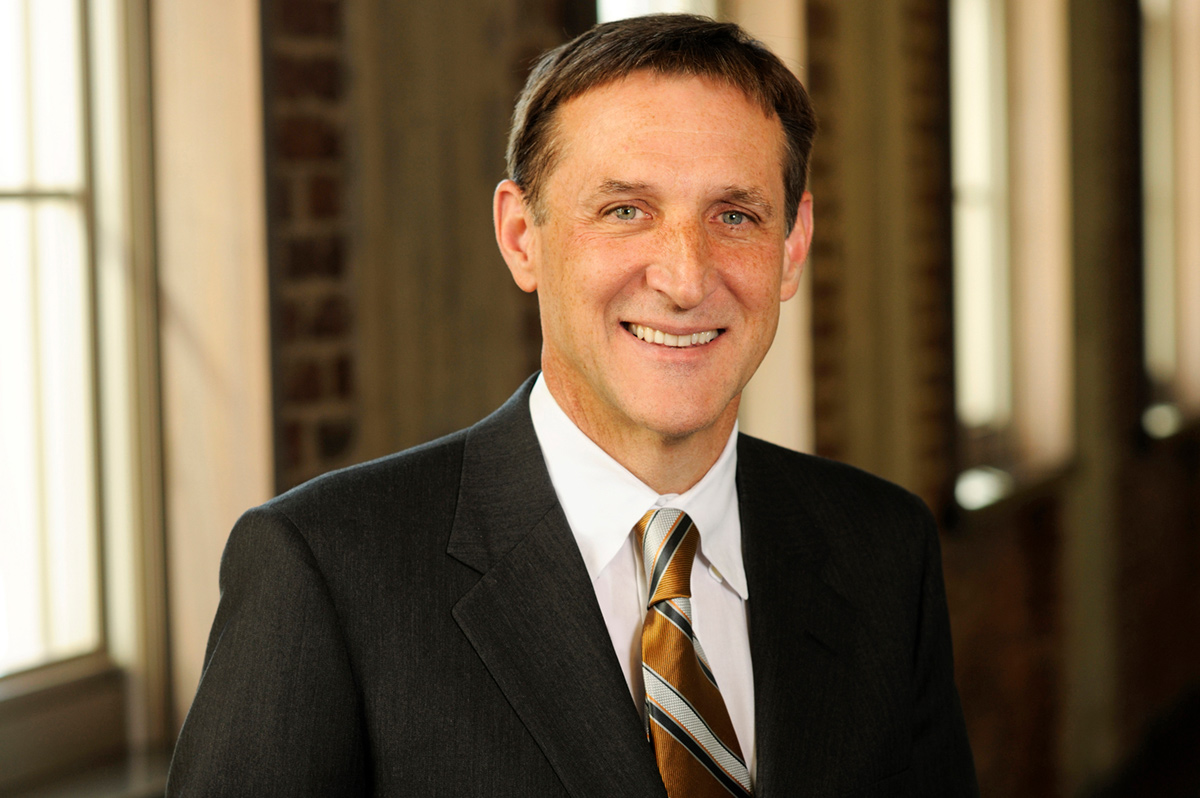Doctor Dean
Christian Larsen Named Dean of the School of Medicine

Jack Kearse
Christian Larsen 80C 84M 91R has transplanted hundreds of living organs from one body to another, premiered an islet transplantation technique, and helped develop a new class of immunosuppressive drugs to ward off organ rejection and increase transplant success.
His newest challenge may find him in the office more often than in the OR or the lab—but it promises to be equally invigorating.
Larsen, an internationally recognized leader in transplant surgery and immunology, was named dean of Emory’s School of Medicine in November. He also serves as vice president for health center integration for the Robert W. Woodruff Health Sciences Center and as chair of the Board of Directors of the Emory Clinic.
“During twenty-two years as an Emory faculty member, he has demonstrated his skills as an outstanding surgeon, scientist, teacher, and colleague, and most important, as a respected leader with the integrity and vision to build innovative new models of integrated patient care,” says S. Wright Caughman, executive vice president for health affairs and CEO of the Woodruff Health Sciences Center. “He has excelled at moving medicine and care delivery forward, not only at Emory, but on a national level.”
Larsen succeeds Thomas J. Lawley, who retired from the deanship last year after sixteen years in that role and will remain a medical faculty member. The School of Medicine is ranked sixteenth nationally in National Institutes of Health (NIH) research funding and has more than fourteen thousand alumni, with one of every four physicians in Georgia having trained at Emory.
Larsen joined the School of Medicine faculty in 1991 and was appointed chair of the school’s Department of Surgery and director of surgical services for Emory Healthcare in 2009. His clinical practice is focused on kidney, pancreas, and islet transplantation at Emory University Hospital and Children’s Healthcare of Atlanta.
Larsen became founding director of the Emory Transplant Center (ETC) in 2001, building and directing one of the foremost research and clinical transplantation programs in the world. Under Larsen, the ETC has been a national pacesetter in establishing new standards to ensure reliable, patient-centered care, focusing on multidisciplinary care a full decade before its recognition as an essential attribute.
“The patients who come to us for transplantation are very vulnerable. It’s a scary time for them,” Larsen said in a recent interview. “We have great knowledge for what they might expect, but for them it’s a new and frightening experience. So seeing our patients as people with families is very much a part of what drives me. That desire to serve and make a difference is just part of who I am.”
In addition, the ETC has been one of the nation’s leading centers for NIH research funding in basic immunology, in translational studies in nonhuman primates, and in large, multicenter clinical trials.
Together with longtime collaborator Thomas Pearson 82M 88R, Larsen has played a pivotal role in discovering a new class of immunosuppressive drugs known as costimulation blockers. Larsen and Pearson helped drive the development of the costimulation blocker belatacept, approved in June 2011 by the US Food and Drug Administration for kidney transplant recipients—the first time a new class of drug had been approved for transplant since the 1990s.
“I remember vividly a young man who had had a transplant, was suffering from diabetes and terrible consequences of that, and I was struck by the fact that we really couldn’t do a lot about that,” Larsen says. “Our research program was always rooted in trying to ask questions and understand biology in ways that would create new opportunities for treatment. I think there’s an excitement for all our nurses, pharmacists, the whole team to be a part of advancing care—not just delivering care, but making it better for the future.”
In 2012, Larsen received a new NIH grant for nearly $20 million to lead a research team continuing development of more effective costimulation blockers for near-term treatment of transplant patients and better strategies for the “holy grail” of transplantation—long-term, true immune tolerance of transplanted organs.
Larsen is a fellow of the American College of Surgeons, an elected member of the American Society for Clinical Investigation, and chair of the NIH NIAID Nonhuman Primate Tolerance Network. He has received numerous research awards, including the Starzl Prize in Surgery and Immunology, the Basic Science Award of the American Society of Transplant Physicians, and the Roche Award, and is a Castle Connolly Top Doctor.





